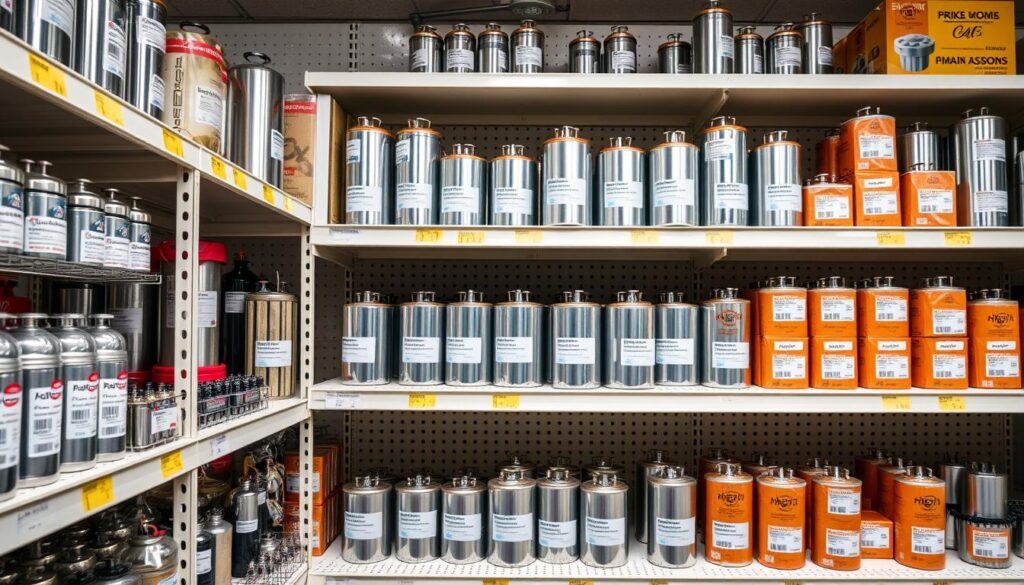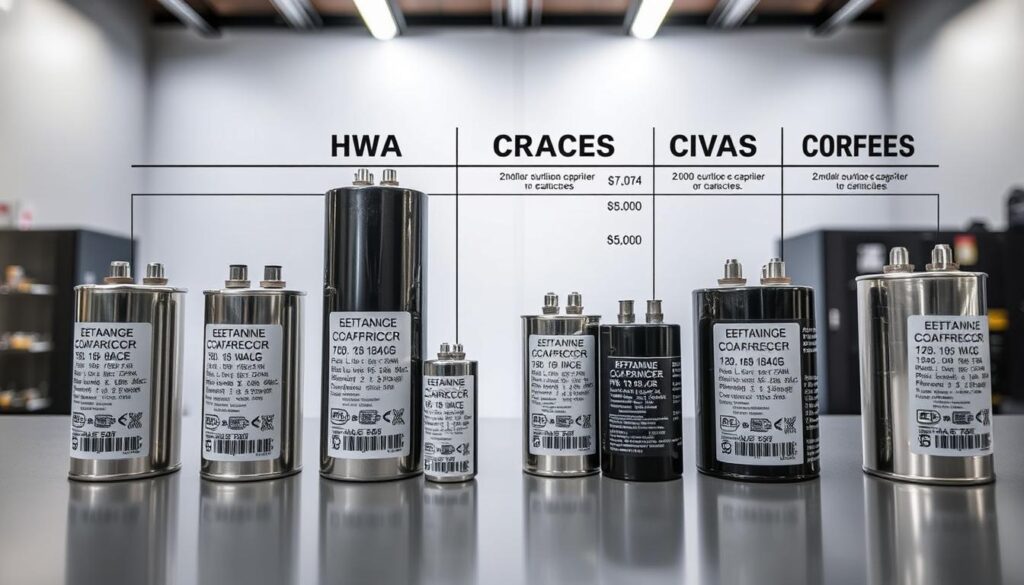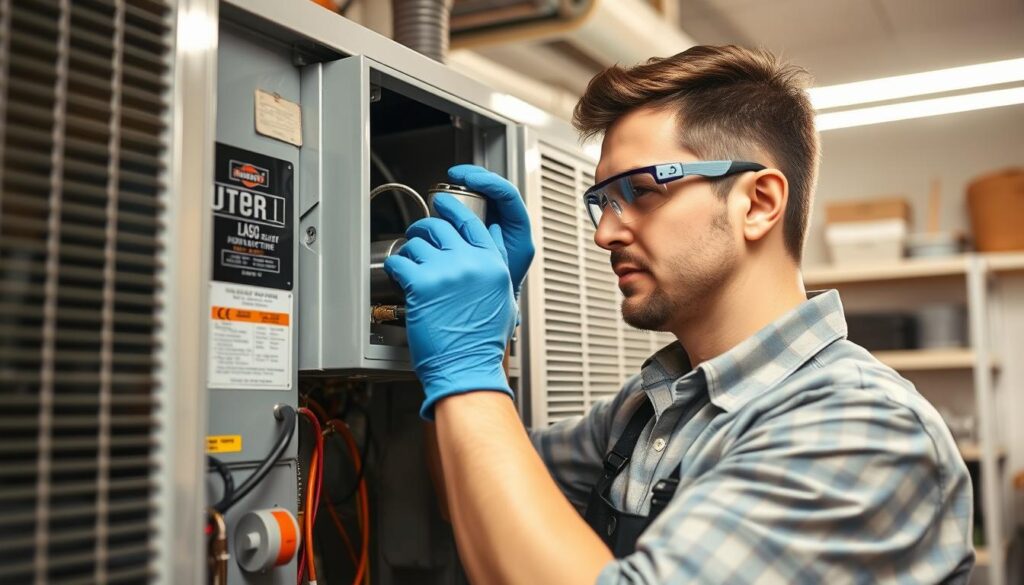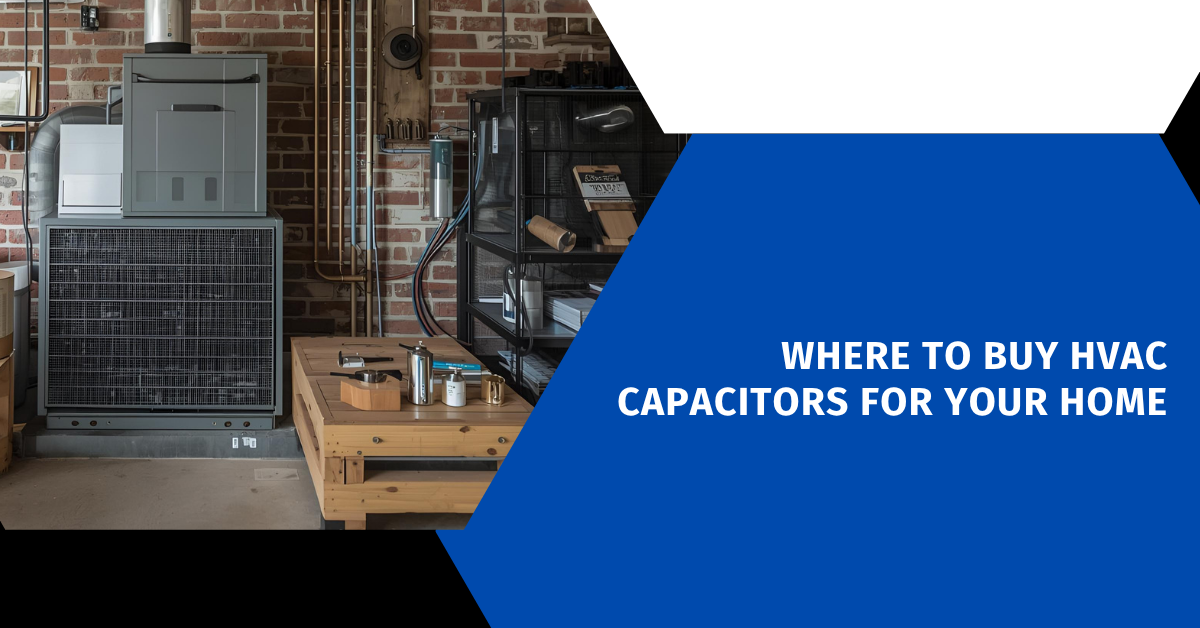Affiliate Disclosure
HVAC Guide Guys is a participant in the Amazon Services LLC Associates Program, an affiliate advertising program designed to provide a means for sites to earn advertising fees by advertising and linking to Amazon.
Where to Buy HVAC Capacitors for Your Home? Are you tired of hot summer days when your air conditioning stops working? What if the solution is as simple as finding the right HVAC capacitor?

HVAC capacitors are key parts that power your home’s air conditioning. Knowing where to buy an hvac capacitor can save you time, money, and stress when your cooling system needs fixing.
Whether you love DIY projects or need professional help, finding the right hvac capacitor suppliers is important. It helps keep your home comfortable and at the right temperature.
Key Takeaways
- Understand the critical role of HVAC capacitors in your cooling system
- Learn multiple purchasing options for replacement capacitors
- Recognize signs of capacitor failure before complete system breakdown
- Know the importance of matching correct capacitor specifications
- Explore both online and local purchasing strategies
Table of Contents
Understanding HVAC Capacitors and Their Function
HVAC capacitors are key parts of your air conditioning system. They help keep your system running smoothly and efficiently. Knowing how they work is important for keeping your AC in top shape.
Capacitors store electrical energy like small batteries. They give the power boost needed for your AC’s motors to start and run. This includes the compressor and fan motor.
Types of HVAC Capacitors
There are two main types of capacitors in AC systems:
- Start Capacitors: Give the initial energy to start the motor
- Run Capacitors: Keep the motor running smoothly
How Capacitors Work in Your AC System
Understanding how capacitors work is key when looking for replacement parts. They create a high-voltage charge that makes a magnetic field. This field is what makes the motor rotate.
| Capacitor Type | Voltage Rating | Typical Lifespan |
|---|---|---|
| Start Capacitor | 370V | 5-10 years |
| Run Capacitor | 440V | 10-20 years |
Signs of Capacitor Failure
Spotting capacitor problems early can save you from expensive AC repairs. Look out for these signs:
- Humming sounds from the AC unit
- Intermittent cooling performance
- Difficulty starting the compressor
- Frequent system shutdowns
Extreme humidity and temperature can wear out capacitors faster. This can shorten their lifespan.
Essential Safety Precautions Before Purchasing a Capacitor
Working with HVAC repair parts needs careful preparation and safety awareness. Before you start with capacitors, knowing the electrical risks is key to your safety.
Electrical safety starts with the right equipment. You’ll need specific protective gear for safe handling of HVAC repair parts:
- Safety glasses with side shields
- Insulated electrician’s work gloves
- Non-conductive tools
- Digital multimeter
- Discharge resistor
Capacitors hold electrical charge, even when the system is off. This stored electricity can be very dangerous if not safely released. Always follow these important safety steps:
- Completely disconnect power at the circuit breaker
- Check for no electrical current with a multimeter
- Discharge capacitor carefully with a proper resistor
- Use insulated tools to avoid accidental contact
Experts say treat every capacitor as dangerous. Even small parts can hold a lot of electrical charge. This can cause serious injury or damage to equipment.
Safety is not an option—it’s a requirement when working with electrical systems.
Explore Our HVAC Shop
Looking for top-rated HVAC tools, parts, and accessories? Visit our shop and find the perfect solution for your needs.
Visit the ShopWhere to Buy HVAC Capacitor: Top Retail Options
Finding the right place to buy an HVAC capacitor can save you time and money. Whether you’re a DIY enthusiast or a professional technician, knowing where to buy a run capacitor near me is key. It ensures quick and reliable replacements.
You have many options for buying HVAC capacitors. These range from local stores to online platforms. Each option has its own benefits, catering to different needs and preferences.
Local HVAC Supply Stores
Local hvac supply stores offer quick solutions for your capacitor needs. They provide several advantages:
- Immediate product availability
- Expert technical advice
- Ability to physically inspect the capacitor before purchasing
- Potential same-day replacement
Online Marketplaces
Online platforms have changed how we buy HVAC capacitors. They offer convenience and competitive prices:
| Platform | Advantages | Typical Price Range |
|---|---|---|
| Amazon | Wide selection, fast shipping | $15 – $50 |
| eBay | Used and new options, possible discounts | $10 – $45 |
| Specialty HVAC Websites | Professional-grade components | $25 – $75 |
Authorized Dealers
Buying from authorized dealers means you get genuine, high-quality capacitors. They offer:
- Manufacturer warranties
- Guaranteed product authenticity
- Technical support
- Precise model matching
When looking for where to buy an hvac capacitor, think about your needs, budget, and urgency. Choose the best option for you.
Explore Our HVAC Shop
Looking for top-rated HVAC tools, parts, and accessories? Visit our shop and find the perfect solution for your needs.
Visit the ShopChoosing the Right Capacitor Specifications
Choosing the right capacitor for your HVAC system is important. Hvac capacitor suppliers know that the right specs are key for the best performance. This is true for ac capacitor replacement parts.
- Voltage rating
- Capacitance value
- Terminal configuration
Understanding Voltage Ratings
Capacitors usually have two voltage ratings: 370V and 440V. Your new part must match or be higher than the old one’s voltage. Never use a lower voltage rating than the original component.
Matching Capacitance Values
Capacitance is measured in microfarads (µF). To find the right value, look at the old capacitor’s label or your HVAC manual. The wrong capacitance can cause poor system performance.
| Voltage Rating | Common Capacitance Range | Typical Application |
|---|---|---|
| 370V | 5-80 µF | Residential HVAC systems |
| 440V | 10-100 µF | Commercial HVAC units |
Terminal Configuration Guide
When picking ac capacitor replacement parts, check the terminal layout. Look at these important details:
- Number of terminals
- Terminal spacing
- Connection type
Working with trusted hvac capacitor suppliers means you’ll get a perfect match. This keeps your system running well.
Popular HVAC Capacitor Brands and Models
When you’re looking to buy an air conditioner capacitor, knowing the top brands is key. Different makers offer unique capacitors for various needs.
Choosing the right capacitor means knowing the best brands and models. Here are some top names in HVAC capacitors:
- Genteq: Known for high-quality round and oval capacitors
- Mars: Offers durable capacitors with consistent performance
- Carrier: Produces capacitors for their HVAC systems
- Lennox: Provides precision-engineered capacitor models
Now, let’s look at common capacitor specs for home air conditioning:
| Brand | Model | Specifications | Typical Applications |
|---|---|---|---|
| Genteq | 97F9895 | 35/5 mfd 440v Round | Central Air Conditioning |
| Mars | 12748 | 30/5 mfd 440v Round | Heat Pump Systems |
| Carrier | C350 | 40/5 mfd 440v Round | Residential HVAC Units |
When you’re at an HVAC parts warehouse, check the capacitor’s voltage, microfarad value, and size. It’s important to match your current capacitor’s specs for system performance.
Your air conditioning system will guide you to the right capacitor. Always check your system’s manual or talk to a pro HVAC tech for the correct replacement.
Explore Our HVAC Shop
Looking for top-rated HVAC tools, parts, and accessories? Visit our shop and find the perfect solution for your needs.
Visit the ShopPrice Comparison Guide for HVAC Capacitors
Finding the right HVAC capacitor can be tough. It’s all about finding a balance between quality and cost. Whether you’re looking online or in a warehouse, knowing what affects prices is key.

Cost Factors to Consider
Several things affect the price of HVAC capacitors:
- Capacitor specifications
- Brand reputation
- Manufacturing quality
- Performance ratings
Budget vs Premium Options
There are different prices for capacitors, each with its own quality level. Cheaper options might save money but could affect your system’s reliability over time.
| Capacitor Type | Price Range | Performance |
|---|---|---|
| Standard Round | $25 – $40 | Basic functionality |
| Premium Dual Run | $45 – $75 | Enhanced durability |
| High-Efficiency | $80 – $120 | Superior performance |
Pro tip: Always check the warranty and return policy when buying online or in a warehouse. It helps protect your investment.
Required Tools for Capacitor Installation
Installing an HVAC capacitor needs specific tools for safety and precision. Having the right tools makes the replacement smooth and effective.
Before starting, collect these key tools:
- Multimeter for electrical testing
- Insulated screwdriver to prevent electrical accidents
- Needle nose pliers for handling small connections
- Jumper cables with a resistor for safe discharge
Your multimeter is key for checking electrical readings. Always test the capacitor’s voltage before removal to prevent electrical hazards. Insulated tools keep you safe from electrical shocks during replacement.
| Tool | Purpose | Safety Rating |
|---|---|---|
| Multimeter | Electrical testing | High |
| Insulated Screwdriver | Safe connection manipulation | High |
| Needle Nose Pliers | Precise component handling | Medium |
| Jumper Cables | Electrical discharge | High |
Experts say quality tools are worth the investment. Cheap or non-insulated tools can be dangerous when working with electrical systems.
Warranty and Return Policies to Consider
When you buy HVAC capacitors, knowing about warranties and returns is key. It saves you time and money. A good capacitor should have solid protection and easy return options.
Looking at warranties needs careful attention. Online stores usually share this info. But, different makers offer different levels of protection.
Manufacturer Warranties: What to Expect
Most HVAC capacitor warranties cover:
- Manufacturing defects
- Electrical performance failures
- Premature component breakdown
- Replacement part provisions
Evaluating Store Return Policies
When you shop online, check the return policies. Look for:
- Return window duration
- Condition requirements for returns
- Restocking fees
- Shipping responsibility
Pro tip: Always keep your original packaging and purchase receipt to streamline possible warranty claims or returns.
Explore Our HVAC Shop
Looking for top-rated HVAC tools, parts, and accessories? Visit our shop and find the perfect solution for your needs.
Visit the ShopCommon Installation Mistakes to Avoid

Working with ac capacitor parts can lead to costly mistakes and safety risks. Many homeowners face issues when replacing hvac repair components. These problems can harm their AC system’s performance.
Before starting, it’s vital to take important precautions:
- Always disconnect power completely from the AC unit
- Discharge existing capacitors safely to prevent electrical shock
- Wear protective electrical safety gear
- Use insulated tools designed for electrical work
Common mistakes include:
- Incorrect wiring connections that can damage your HVAC system
- Selecting capacitors with mismatched voltage or capacitance ratings
- Failing to match terminal configurations precisely
- Neglecting manufacturer-specific installation instructions
Experts suggest comparing your old capacitor’s specs with the new one. Look at:
- Exact voltage requirements
- Microfarad (μF) ratings
- Physical mounting dimensions
- Terminal types and placement
Knowing these common mistakes helps you avoid problems. This ensures a safe and effective capacitor replacement. It protects your HVAC system and keeps you safe.
Professional vs DIY Capacitor Replacement
Choosing between professional and DIY capacitor replacement for your HVAC system is a big decision. You need to think about your technical skills, safety awareness, and comfort with electrical repairs. When you’re looking to buy an HVAC capacitor, these factors are key.
DIY replacement can be cheaper, but it’s risky. Experts say you should know a few important things before trying to replace a capacitor:
- Electrical safety knowledge
- Proper diagnostic skills
- Understanding of HVAC system specifications
- Access to correct replacement parts
When should you call a professional? Experts suggest calling a technician if you:
- Lack electrical repair experience
- Are unsure about HVAC system specifications
- Cannot confidently identify capacitor issues
- Want to maintain system warranty
Choosing a qualified HVAC technician is important. Look for credentials, read customer reviews, and check for professional certifications. A good technician can quickly find and fix capacitor problems, making sure your system works well.
If you’re looking to buy HVAC capacitor parts and need professional installation, local HVAC supply stores and authorized dealers can help. While DIY might seem cheaper, hiring a pro ensures your system is safe and works right.
Explore Our HVAC Shop
Looking for top-rated HVAC tools, parts, and accessories? Visit our shop and find the perfect solution for your needs.
Visit the ShopMaintaining Your New HVAC Capacitor
Keeping your HVAC system in top shape is key. Your air conditioner capacitor is a vital part of this. It helps keep your home cool and comfy. Taking good care of it can save you money and avoid sudden breakdowns.
Protecting your HVAC capacitor is all about being proactive. Regular upkeep ensures it works well for a long time. This is important for your electrical system’s health.
Essential Maintenance Strategies
- Keep the capacitor clean from dust and debris
- Check electrical connections periodically
- Protect the unit from extreme temperature fluctuations
- Inspect for signs of wear or damage
Lifespan Extension Techniques
Here are some tips to get the most out of your air conditioner capacitor:
- Maintain consistent voltage supply
- Install surge protectors
- Schedule annual professional inspections
| Maintenance Action | Frequency | Benefit |
|---|---|---|
| Visual Inspection | Every 6 months | Prevent possible failures |
| Professional Checkup | Annually | Full system health check |
| Clean Surrounding Area | Quarterly | Less debris buildup |
Expert tip: Most hvac repair components like capacitors can last up to 20 years with proper care and maintenance.
Conclusion
Finding the right HVAC capacitor is important. You’ve learned how to find the best one. You can look in local stores, online, or through authorized dealers.
Always be careful when choosing and installing a capacitor. Make sure the voltage and capacitance match. Getting help from a pro can avoid big problems and keep your system running well.
Doing your homework on capacitors can save you money and keep your system working. Regular checks and choosing quality parts from trusted suppliers are key. This helps your system last longer and work better.
This guide has given you the tools to make smart choices about your HVAC capacitor. Being proactive will keep your cooling system running smoothly and prevent sudden failures.

